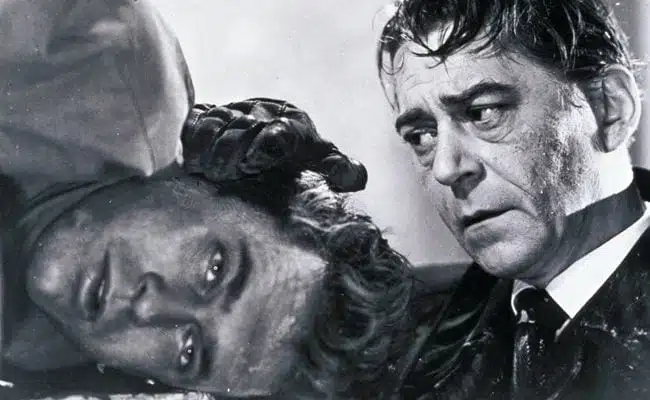
In no small part due to Rififi’s influence, heist films traditionally have derived much of their pleasure and appeal from the counterplay between what is shown and not shown. Think of recent examples like Steven Soderbergh’s first two Ocean‘s films, Ocean’s Eleven and Ocean’s Thirteen, both of which present one possible scenario for the heist before pulling a switch and revealing the gang’s actual plan which has been executed concurrently with their elaborate ruse.
The planning, setup, and execution are still central to that climactic thrill of seeing the true plot snap into place, no less than in the comparatively straightforward burgles of Michael Mann’s Thief or David Mamet’s constantly pivoting Heist. Roger Ebert’s review of the card-shark character study Hard Eight put it best: “I like movies that show me precisely how to get away with something.”
Rififi shows us the getting away, and the getting, perhaps better than anyone ever did before or would again. The second act is methodical and pragmatic to a fault; issues like character and theme are forgotten as the assembled team (the pinch hitter is a safecracker played by director Jules Dassin himself) set down to solve the problems before them. Sitting at a window observing deliveries in the early morning hours gives the thieves a deadline to make: ten minutes before six.
A trip into the jewelry store tips them off as to the state-of-the-art alarm system they’ll have to evade, and a scene of luxurious detail shows them hunkered together, tinkering with the machine to determine just how far they can push their luck. These are not genius criminals pulling a magician’s trick. They are real men hammering their heads against a serious problem, until finally a tentative solution appears. It is no panacea: it will demand patience, sweat, silence, and five hours of physical labor. The getting’s never easy.
Freed of the constraints of America’s Production Code, Dassin never bothers passing a moral judgment on the crime. He is, instead, interested in a specific choice made by ex-convict Tony the Stephanois, a switch that seems to flip in his mind after he sees his old lover bound to Pierre Grutter, club owner and leader of a feared criminal gang.
Tony takes her back to his apartment and the sound of blows and her cries echo in the small space while the camera pushes in another direction, toward an old photo of them as the happy couple. Only after this encounter does Tony express interested in Mario Ferrari’s idea of a jewel heist, but not as the proposed smash-and-grab operation that will yield only the display window’s wares. Instead, Tony suggests a play for the safe, and a more elaborate plan.
This suggests not just an awakened greed on Tony’s part but an impulse to try things a different way; their eventual scheme ends up perhaps not easy or bloodless, but it boasts an elegance that the straightforward sledgehammer-to-window approach wouldn’t have had. Dassin’s interested not just in how to get away with a crime but how the choices his criminals make make up their compromised existence within the criminal underworld.
Can you be a crook and an artiste, like Dassin’s fey safecracker who proves, shall we say, a disappointment? One of the film’s most indelible images sees his character trapped backstage at the club L’age d’or, amid ropes, stage props and musical instruments, all signs of culture, as the camera dollies backward and leaves him helpless and insignificant as a pinprick at the frame’s vanishing point.
For Rififi is structured rather like a musical, the title itself explained in a gaudy song-and-dance number at L’age d’or. It’s an ominous ditty, if not of much interest as performed, one whose lyrics warn that everything will come to senseless violence in the end. As the one venture into straight-up musical territory, it’s the most inelegant of Dassin’s alterations to the source novel.
But look again at those violins backstage, the umbrella that serves as a crucial tool in the heist, the scenes of preparation and observation that draw on the city symphony genre and the works of Rene Clair, or a moment of keen frustration and fury for Tony as he stands onstage in the empty club. Like so many great artists of the shoestring B-picture — perhaps Edgar Ulmer most of all — Dassin’s scenes feel composed rather than shot, staged and scripted.
The wordless, 30 minute heist scene is a showstopper in the most literal sense for this revue without melodies or lyrics, one in which the absence of emotion is itself its most potent and violent expression. The bodies pile up with precious little slipping of the masks even in death, all building to an oddly serene final race against time that indicates what Tony has wanted all along, what he hoped his share of the loot might buy him. If it’s a hushed, underwhelming sort of finale, that only seems fitting. In musicals, you don’t always remember the particulars of the last scene, where the characters end up, or the lesson that’s been learned. You remember the songs.
Boasting by far the ugliest packaging and menu artwork for a Criterion Blu-ray to date, its update of Rififi arrives with little supplemental fanfare, reflecting the influential film’s contemporary status as something of a critical afterthought, if still a respected benchmark. The booklet essay by great American critic J. Hoberman pays homage to the persistence of Dassin’s career (thriving abroad during a period of blacklisting in America), but seems unable to muster up much enthusiasm for the picture.
The accompanying half-hour video interview with Dassin is a holdover from the 2001 DVD release, while the English audio track is only noteworthy for its professional execution. This is one of Criterion’s most perfunctory releases, fulfilling its usual expectations of quality presentation while giving none but the most determined of collectors any impetus to place an order.

